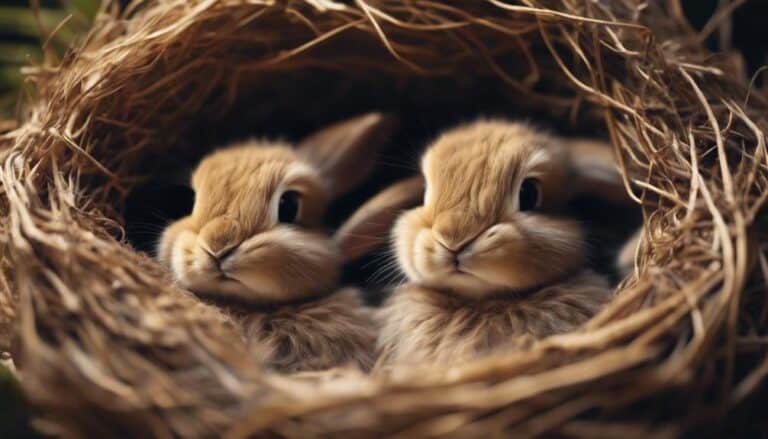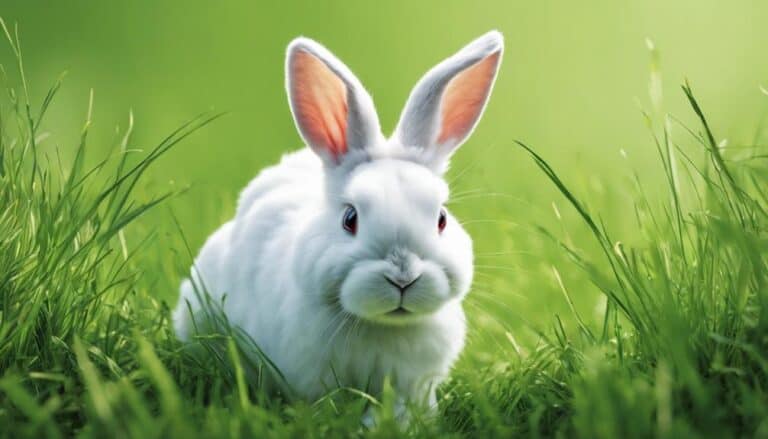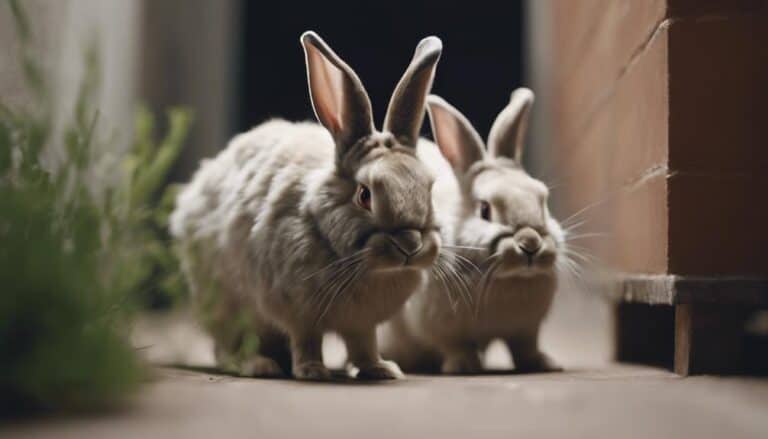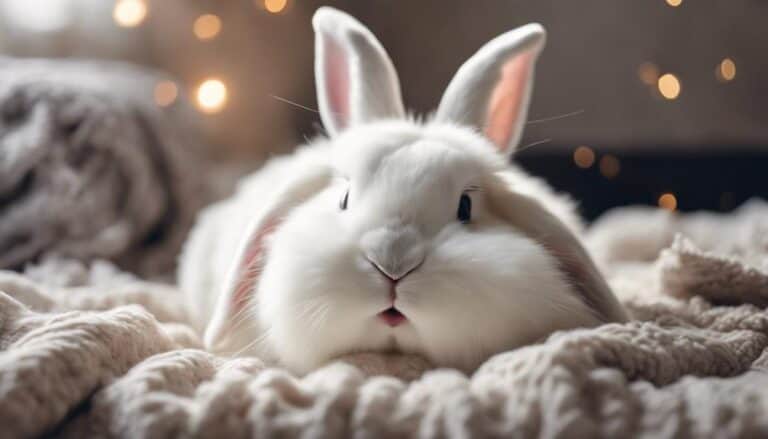If you're thinking of getting a rabbit as a pet, their cute faces and playful personalities can be pretty hard to resist. But before you bring one home, it's essential to understand what caring for them entails.
Rabbits need specific diets and environments, which can be challenging for owners.
For example, rabbits are herbivores, so they need a diet rich in fiber and low in protein. This means you'll need to provide them with plenty of fresh veggies and hay.
They also need a lot of exercise, so you'll need to give them plenty of space to move around and play.
In addition to their dietary needs, rabbits also have specific environmental requirements.
They're sensitive to temperature extremes, so you'll need to keep their living space cool in the summer and warm in the winter.
They're also prone to health problems like respiratory issues and parasites, so regular vet check-ups are crucial.
While caring for a rabbit can be complex, it's definitely doable with the right knowledge and commitment.
By doing your research and providing the right care, you can help your rabbit live a happy and healthy life.
Contents
Key Takeaways
Taking care of a rabbit can seem daunting, but it's actually pretty straightforward. First and foremost, you need to make sure they're eating a balanced diet. This means feeding them plenty of hay, veggies, and limiting their pellet intake.
When it comes to housing, rabbits need space to move around and exercise. A cramped cage can lead to a sad and unhealthy bunny. So, make sure you've got a spacious enclosure that allows them to stretch their legs.
Rabbits are also social creatures, so they need companionship and socialization. This can be as simple as spending time with them, petting them, or just letting them hop around your living room.
Regular trips to the vet are also a must. Rabbits need regular check-ups to stay healthy, and they also need regular grooming to prevent hairballs and other issues.
Finally, handling, exercise, and supervision are essential for a happy rabbit. This means getting them used to being handled, providing them with plenty of toys and stimulation, and keeping an eye on them to make sure they're not getting into trouble.
Rabbit Care Requirements
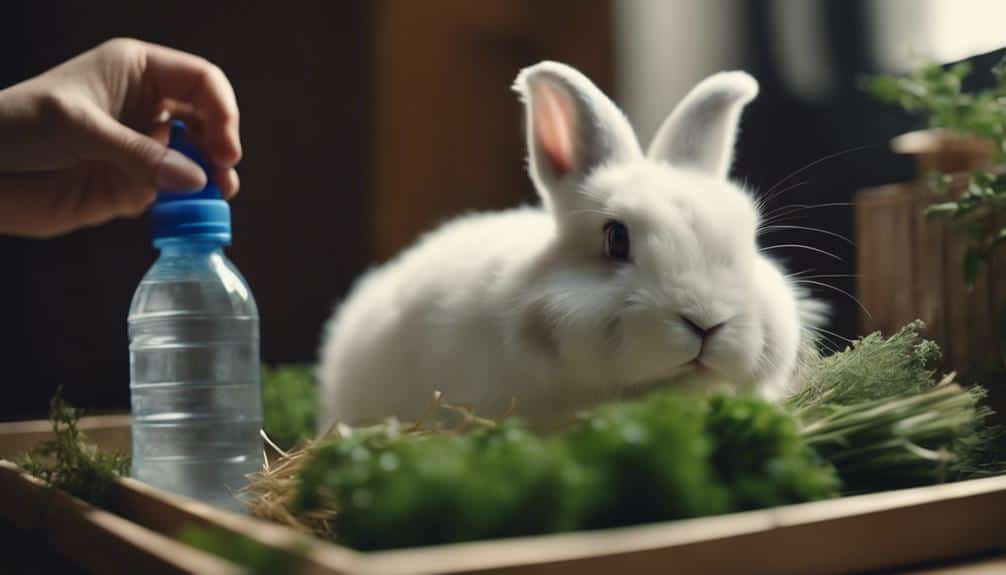
So, you want to make sure your pet rabbit stays happy and healthy? To do that, you need to meet their specific care requirements.
Rabbits need a balanced diet that includes unlimited access to hay, limited pellets, and fresh veggies. This will help keep them healthy and prevent tummy troubles.
Their enclosure should be at least three hops long and twice as wide as the rabbit. It should also have areas for rest and exercise. This is crucial for their physical and mental well-being.
Your rabbit needs daily exercise outside of their hutch, with at least four hours of supervised playtime. This will help prevent boredom and behavioral problems.
Regular veterinary check-ups are also a must. You'll need to take your rabbit to the vet at least once a year, which typically costs between $100-$150. And, it's super important to find a vet who knows their stuff when it comes to rabbits, just in case you need emergency care.
Socialization and gentle handling are key to preventing stress and building a strong bond with your pet rabbit. By following these care requirements, you'll be well on your way to raising a happy and healthy bunny!
Housing and Space Needs
So, you want to give your rabbit a happy and healthy life, right?
To do that, you'll need to provide a safe and comfortable living space that meets their needs for shelter and exercise.
When setting up your rabbit's enclosure, make sure it's big enough to keep them happy and healthy.
The hutch should have a dark, dry area for resting and a spacious, well-lit section for exercise.
And, please, avoid wire floors – they can be really uncomfortable for rabbits.
Instead, opt for a solid, non-slip surface.
Your rabbit needs a separate outdoor area where they can exercise and explore.
This is crucial for their well-being.
The hutch should be at least three hops long.
The width should be at least twice the length of your rabbit.
Your rabbit needs at least four hours of exercise outside their hutch every day.
Make sure the hutch is well-ventilated.
And, remember, the flooring should be solid and non-slip.
Dietary Considerations for Rabbits
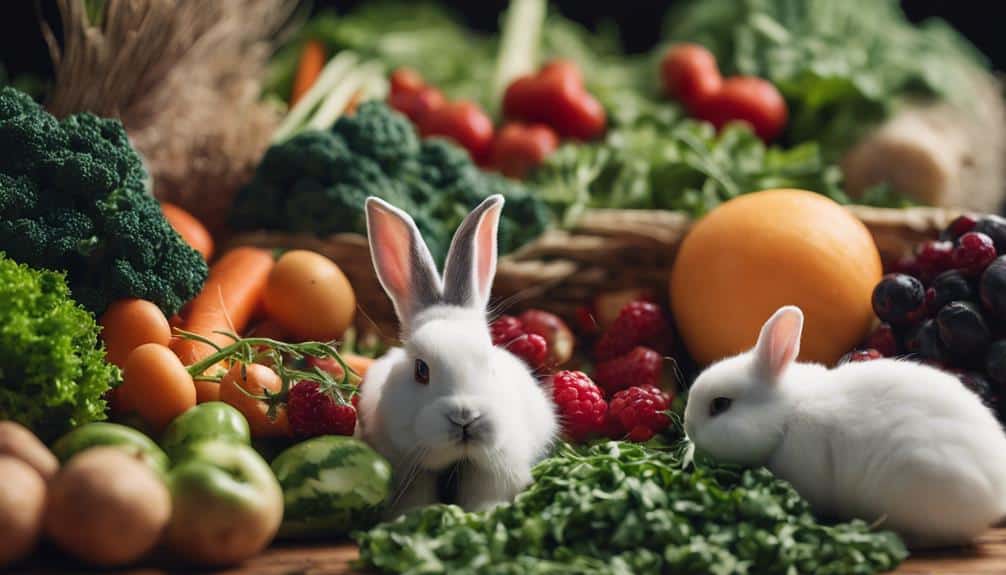
Rabbits are herbivores, which means they need to eat a diet that's mostly made up of plant-based foods.
Their main staple should be fresh hay. This is because hay is high in fiber, which is really important for keeping their digestive system healthy.
You should also give them a variety of fresh veggies every day. These can include things like leafy greens, carrots, and bell peppers.
Pellets can be a convenient way to make sure your rabbit is getting all the nutrients they need, but they should only make up a small part of their diet. Overfeeding on pellets can lead to obesity and other health problems.
A balanced diet rich in nutrients is key to keeping your rabbit healthy and happy. A healthy diet is essential for maintaining their overall well-being, so make sure you're doing your research and providing the best possible food for your furry friend.
Rabbit Diet Basics
A healthy rabbit diet is all about balance. Rabbits can get into serious gastrointestinal trouble if their diet is out of whack.
Fresh leafy greens and veggies should be a daily staple, about 2 cups worth. Grass hay should make up around 80% of their daily food intake. Rabbits need to graze frequently, so they should be eating small amounts often, like 30 times a day, with each serving around 2 to 8 grams.
Pellets should only make up a small part of their diet, about 1/4 to 1/2 cup per day. Sugary fruits, muesli-style foods, and freshly cut grass should be avoided as they can wreak havoc on their tummies.
Fresh Hay Importance
To keep your rabbit's digestive system in top shape, you need to make sure they're getting plenty of fresh hay. Hay is essential to a rabbit's diet because it provides the fiber they need to digest their food properly and avoid gastrointestinal problems.
It's a good idea to offer a variety of hays, like timothy hay, orchard grass, or oat hay, to keep your rabbit interested in eating.
You can also keep an eye on your rabbit's grooming habits to make sure they're eating enough hay and that their digestive system is working properly.
Remember, rabbits are grazers, so they need to eat constantly. That means they need unlimited access to hay.
It's also important to monitor how much hay your rabbit is eating to make sure they're getting enough.
Hay has another important benefit – it helps wear down your rabbit's teeth, which never stop growing.
To keep their teeth healthy, you should provide hay in small amounts throughout the day.
Pellets and Vegetables
When it comes to feeding your rabbit, getting the balance right between pellets and vegetables is crucial.
The right ratios are key. Your rabbit's diet should consist mainly of hay – around 80-90% of their daily intake. This should be supplemented with vegetables making up 5-10% and pellets around 1-5%. This balance is vital for maintaining peak health and nutrition.
When it comes to vegetables, variety is the spice of life. Fresh leafy greens like kale, spinach, and collard greens are packed with essential vitamins and minerals. Make sure to mix it up and include a range of colorful vegetables to ensure your rabbit gets a diverse intake of nutrients.
Pellets are important, but don't overdo it. Limit your rabbit's pellet intake to around 1/4 to 1/2 cup per day for an average-sized rabbit. Remember, overfeeding pellets can lead to obesity and other health issues, so moderation is key to promoting a healthy lifestyle.
Socialization and Companionship
Rabbits really need to have friends and be social. This is why it's so important to get them a buddy rabbit, so they can live happy and fulfilling lives.
When rabbits are socialized, it's really good for their mental health and helps them live happy, interesting lives.
Getting close to your rabbit is a great experience that helps you connect with each other and creates a peaceful environment for both of you.
Importance of Companionship
Rabbits are social animals that need companionship to thrive. Without friends, they can become stressed, lonely, and bored. In fact, encouraging social interactions among rabbits is essential for their overall well-being and mental health.
When rabbits have a friend, they form strong bonds, providing each other with comfort and security. This emotional support helps reduce stress and alleviates loneliness. Imagine having a buddy to hang out with – it's the same for rabbits!
Socializing with a companion rabbit also allows for natural behaviors like grooming, playing, and communicating through body language. This stimulation promotes mental agility and prevents boredom. It's like having a workout buddy, but instead of going to the gym, they're hopping around and having fun!
Companionship can even lead to a healthier lifestyle for rabbits. Socialized rabbits tend to be more active, eat better, and have lower instances of depression or anxiety. It's like having a motivational coach, but instead of yelling at them to exercise, they're encouraging each other to hop around and snack on some fresh veggies!
In the end, ensuring that rabbits have companions not only fulfills their social needs but also contributes to their overall happiness and well-being. So, if you're thinking of getting a pet rabbit, consider getting two – they'll thank you for it!
Socialization Benefits for Rabbits
Socialization benefits for rabbits are rooted in providing companionship, which is key to promoting their mental and emotional well-being. Rabbits are social animals that thrive on interacting with others, so they need to have friends to stay healthy.
When introducing a new companion to your rabbit, it's essential to do it gradually and under supervised conditions. This helps ensure a smooth bonding process.
Having a companion provides your rabbit with the attention and interaction they need, which leads to a healthy relationship that benefits their behavioral enrichment.
Bonding With Rabbit Buddy
Creating a welcoming and safe environment for your rabbit buddy is crucial in encouraging bonding through daily interactions and companionship. Rabbits are social creatures that thrive on companionship, so keeping them in bonded pairs is essential for their well-being.
When introducing your rabbit to other pets or children, always supervise their interactions to prevent accidents and ensure a positive experience for everyone involved.
Regular interaction between your rabbits is vital to strengthen their bond and prevent loneliness. Rabbits can get stressed when left alone for extended periods, so make sure they get quality time together.
Spaying or neutering your rabbits can also lead to a more harmonious relationship between them. This reduces the likelihood of aggression and territorial behavior, promoting a more peaceful coexistence.
Health Maintenance for Rabbits
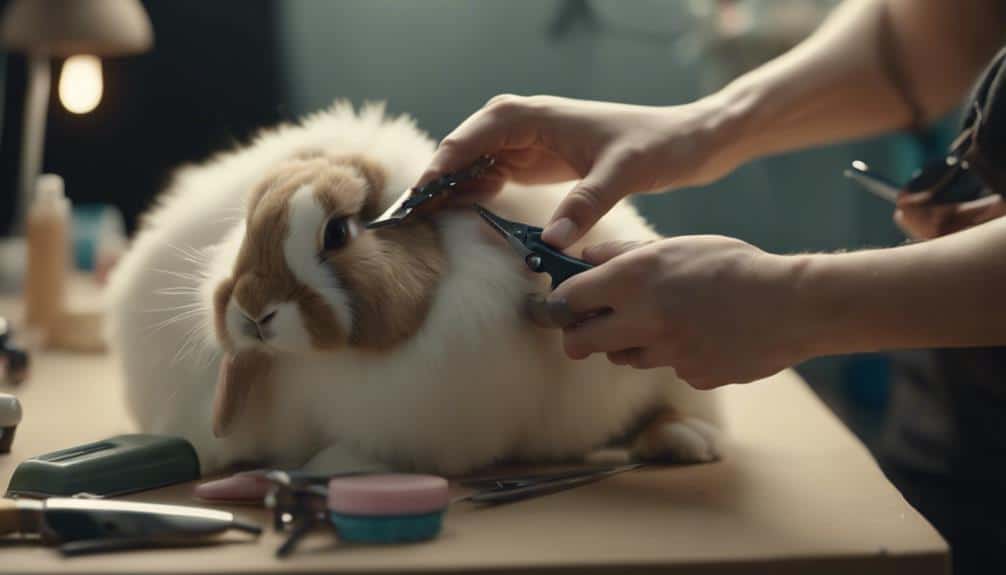
Regular veterinary check-ups are crucial for your rabbit's health.
These check-ups can help detect potential health issues early on, which is vital for their well-being.
You should take your rabbit to the vet at least once a year, which usually costs between $100 and $150. Regular check-ups help ensure your rabbit remains healthy and free from common illnesses. Additionally, you should budget for vaccinations, which can also add to the average cost of owning rabbits. Including food, bedding, and other supplies, it’s essential to consider these expenses when planning for a pet rabbit.
This will help identify any emerging concerns and keep your rabbit healthy.
Also, make sure to get your rabbit vaccinated against diseases like myxomatosis and RHD, which can be fatal if left untreated.
A balanced diet is also vital for your rabbit's health.
Hay should make up most of their diet, with limited pellets and fresh veggies as supplements.
This will help prevent dental problems, which can lead to other health issues.
Regular grooming is also a must, especially for long-haired breeds.
Matting and hairballs can cause serious health complications if left unchecked.
If you neglect these aspects of care, your rabbit is at risk of developing respiratory infections, heat stress, and other health complications.
Handling and Exercise Tips
Handling and exercise are crucial for your rabbit's well-being and your relationship with them.
When handling your rabbit, sit down to prevent falls and reduce the risk of injuries. Hold your rabbit with two hands, keeping them close to your chest or on your lap for security and comfort. This helps them feel safe and develops a bond between you two, especially if you start handling them from a young age.
Rabbits need to get out of their hutch daily for exercise. They require a minimum of four hours of free-range time in a safe and rabbit-proofed area. This exercise time is essential for their physical and mental health.
To keep them engaged, you can provide toys, obstacles, and food treats during this time.
It's also important to have a separate exercise area from their enclosure. This prevents boredom, stress, and behavioral issues. Even if you have a small hutch, make sure you have a designated exercise space to promote your rabbit's well-being.
Conclusion
So, you wanna know if rabbits are difficult to take care of? Well, the answer is, it can be if you're not willing to put in the effort. Rabbits have specific needs, and if you don't meet them, things can get tough.
They need space. Rabbits need room to move around, stretch out, and exercise. If you can't provide a big enough living area, they'll get bored, stressed, and even sick. They also need a balanced diet, which means giving them the right food in the right amounts. It's not just about throwing some pellets in a bowl and calling it a day.
Rabbits also need exercise, socialization, and regular healthcare check-ups. They need to move around, play, and interact with you and other rabbits. If you don't give them enough attention, they'll get lonely, anxious, or even aggressive.
But if you're willing to put in the work, caring for rabbits can be super rewarding. You'll get to see them happy, healthy, and thriving. You'll form a strong bond with them, and they'll become loving companions.
So, are rabbits difficult to take care of? Only if you're not willing to commit to their needs. If you're dedicated to giving them the best life possible, you'll find that it's totally worth it.

